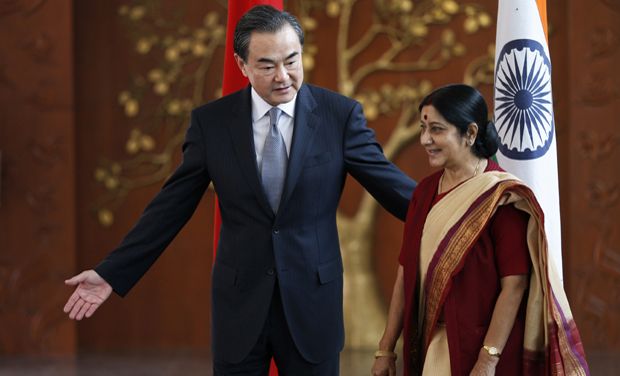Narendra Modi initiates 'strong' foreign policy ahead of China talks
- Details
- Category: National Political News
- Last Updated: Thursday, 22 January 2015 20:59
Narendra Modi initiates 'strong' foreign policy ahead of China talks
NEW DELHI: For India to catch up with China, Prime Minister Narendra Modi has a three-point agenda. "We need skills, scale and speed if we have to think of competing with China," Modi said. The PM's remarks in the middle of the first Parliament session of his government, building up to his first budget, are seen to be an important indicator of the kind of decisions his government may be considering.

Releasing a book 'Getting India Back on Track' by Bibek Debroy and Ashley Tellis of the Carnegie Endowment for International Peace, Modi also focused on four big colour revolutions that he wants to bring about in India.
Modi's remarks on China came on a day the Chinese foreign minister met his counterpart Sushma Swaraj and opened discussions with the new government.
India needs skills to be able to reap the power of its demographic dividend, Modi said. "We need skilled manpower in this country. We should be in a position where India can export teachers, nurses and skilled professionals to the world," he added.
The book release, the first in his official residence, was dotted by the Modi government's power elite — from top officials like principal secretary Nripendra Misra and NSA Ajit Doval, top secretaries like foreign secretary Sujatha Singh, former cabinet secretary Naresh Chandra, industrialists Sunil Mittal and Gautam Thapar etc. But apart from Arun Jaitley, there were no other Cabinet ministers at the function.
Modi said a "saffron" revolution for energy, particularly through renewables like solar energy, will be the focus for his government. Also read...narendra modi Government work updates
India may be one of the top producers of milk in the world, but Modi decried the low productivity in the sector. Calling for a "white" revolution to modernize the dairy sector, he said it was necessary to create support systems and inject newer technology, animal research etc to breathe life into the sector.
Modi repeated his call for a second green revolution, calling for greater agricultural productivity. "We should focus on pulses, which have not seen fresh research for decades. Our focus should be on increasing the protein content of pulses," he said. Pushing for a more integrated approach to warehouses, for instances, he said India could save a substantial amount of food wastage.
A blue revolution, Modi said, should happen in the area of fisheries and better water management, particularly since India is a water-stressed nation. "More crop per drop can happen through innovative technologies like micro irrigation," he said, giving the example of his work in Gujarat.
Talking to journalists later, Modi said climate change was a subject close to his heart, referring to his book on tackling climate change 'Convenient Action'. "Look at the US. They used to be dependent on Middle East oil, now they are a net exporter of energy. That's where we want to be," he said. He added that the environment versus development debate should not be seen through a western perspective but from an Indian point of view.
Urban development will also get a massive push from his government. "We look at urban centres as a burden, a challenge, not opportunity, even though that's where the growth is." Calling for an "intellectual manthan", Modi said Indians should move beyond roads, highways and ports when we talk of infrastructure. "New cities will be built where there are i-ways, not only highways."
But he reserved his deepest concern for ways to develop India's intellectual capital. Echoing his predecessor Manmohan Singh in this respect, Modi regretted there was low intellectual input into policy making in India. "Universities play a big role in other countries, but not here."
source:http://timesofindia.indiatimes.com/,



